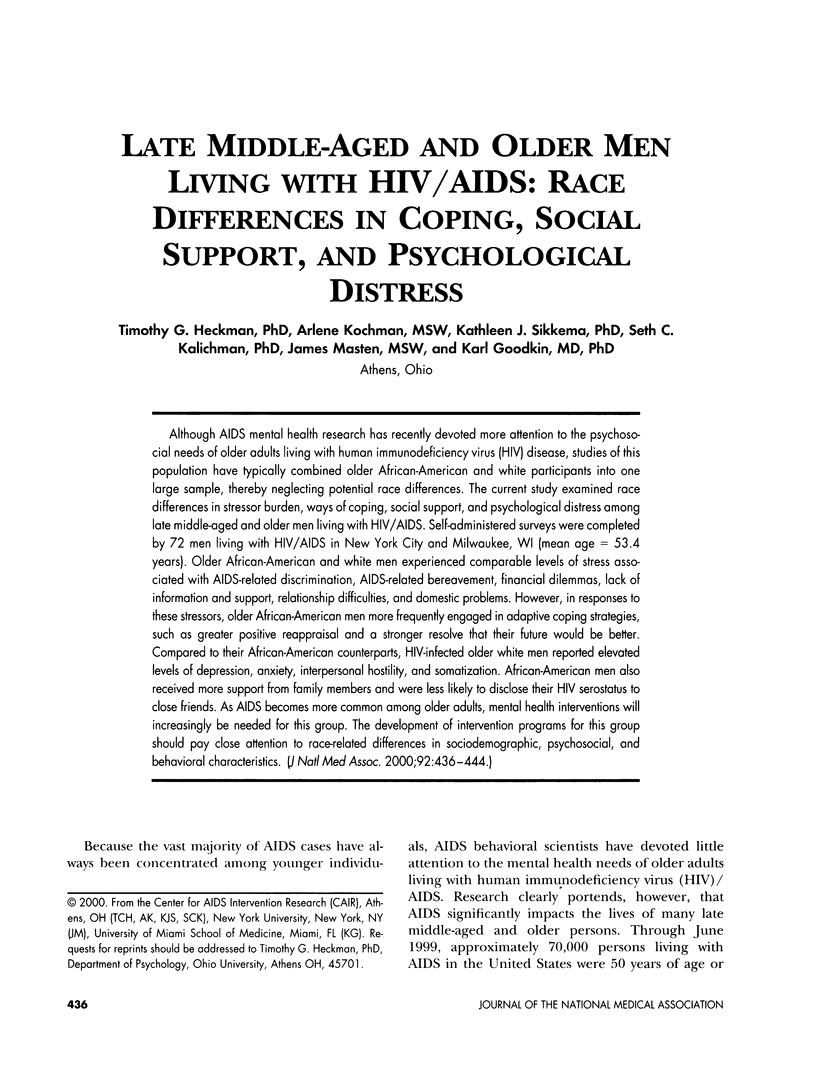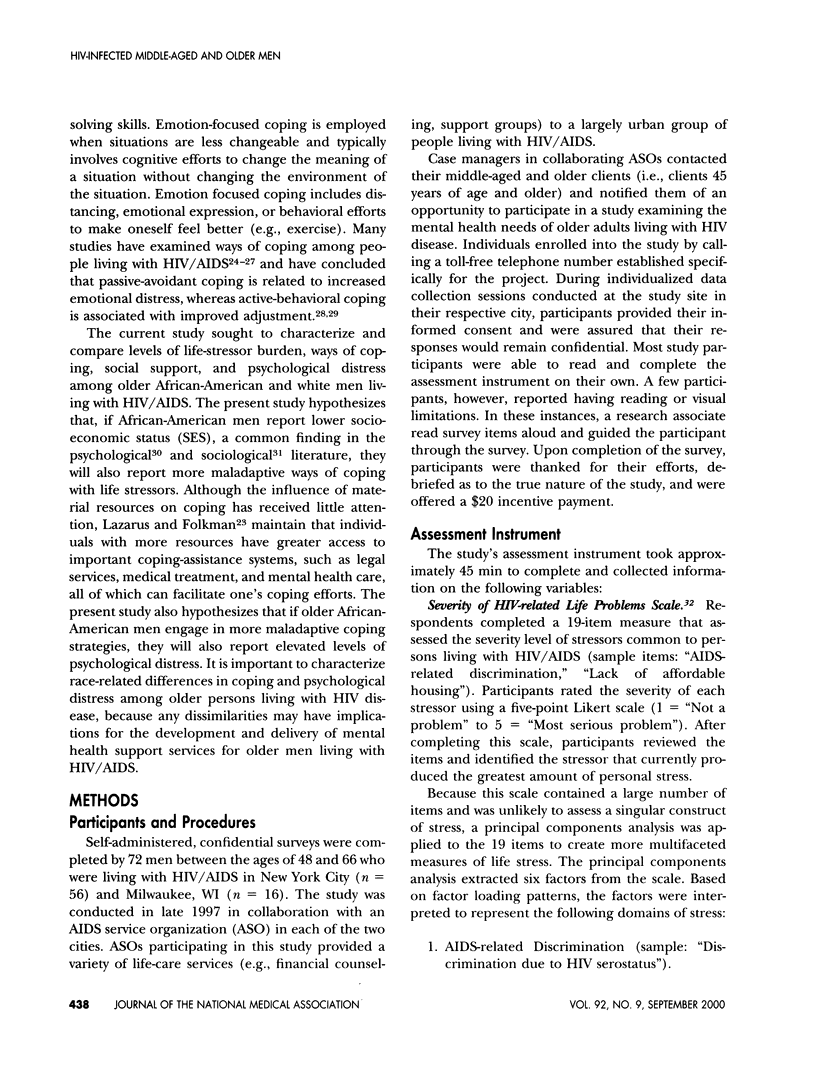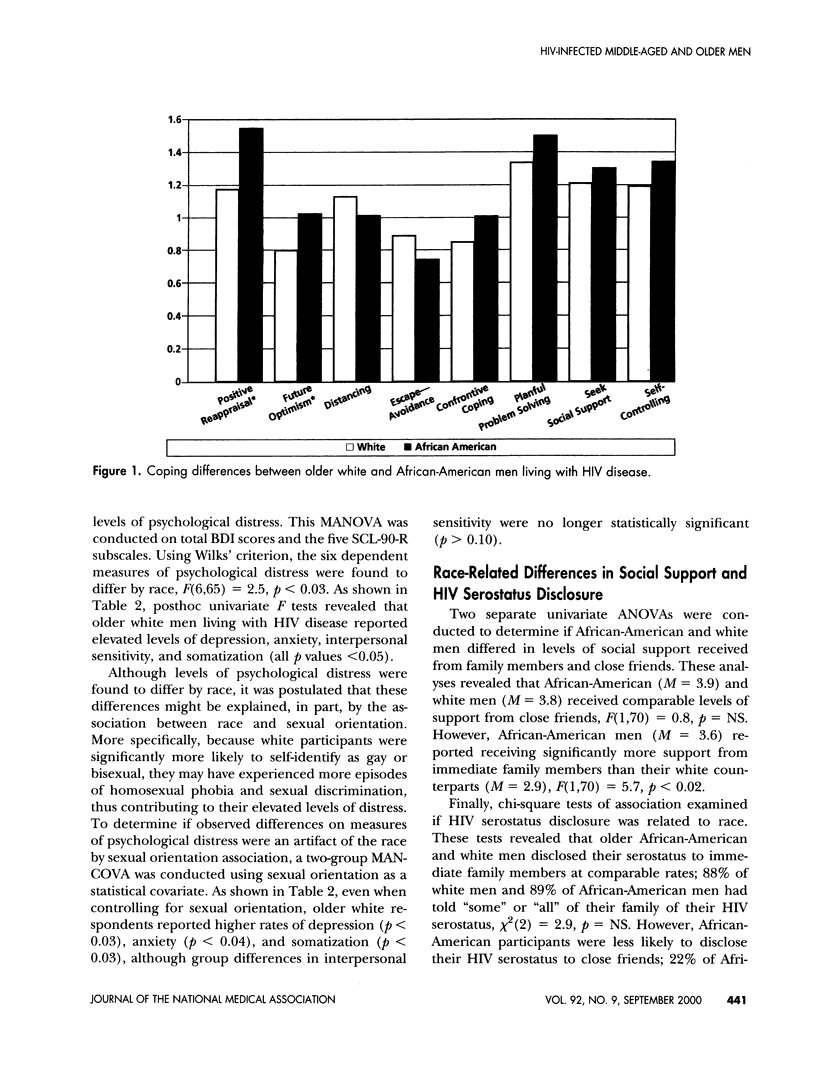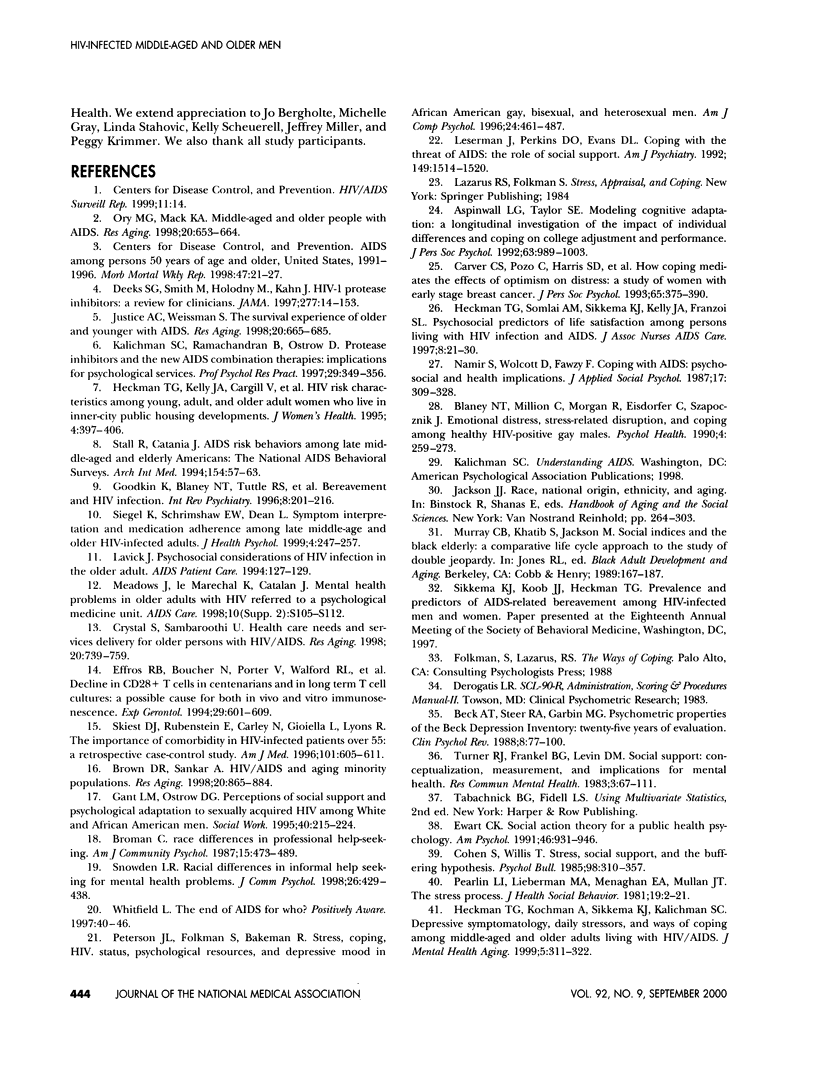Abstract
Although AIDS mental health research has recently devoted more attention to the psychosocial needs of older adults living with human immunodeficiency virus (HIV) disease, studies of this population have typically combined older African-American and white participants into one large sample, thereby neglecting potential race differences. The current study examined race differences in stressor burden, ways of coping, social support, and psychological distress among late middle-aged and older men living with HIV/AIDS. Self-administered surveys were completed by 72 men living with HIV/AIDS in New York City and Milwaukee, WI (mean age = 53.4 years). Older African-American and white men experienced comparable levels of stress associated with AIDS-related discrimination, AIDS-related bereavement, financial dilemmas, lack of information and support, relationship difficulties, and domestic problems. However, in responses to these stressors, older African-American men more frequently engaged in adaptive coping strategies, such as greater positive reappraisal and a stronger resolve that their future would be better. Compared to their African-American counterparts, HIV-infected older white men reported elevated levels of depression, anxiety, interpersonal hostility, and somatization. African-American men also received more support from family members and were less likely to disclose their HIV serostatus to close friends. As AIDS becomes more common among older adults, mental health-interventions will increasingly be needed for this group. The development of intervention programs for this group should pay close attention to race-related differences in sociodemographic, psychosocial, and behavioral characteristics.
Full text
PDF








Selected References
These references are in PubMed. This may not be the complete list of references from this article.
- Aspinwall L. G., Taylor S. E. Modeling cognitive adaptation: a longitudinal investigation of the impact of individual differences and coping on college adjustment and performance. J Pers Soc Psychol. 1992 Dec;63(6):989–1003. doi: 10.1037//0022-3514.63.6.989. [DOI] [PubMed] [Google Scholar]
- Broman C. L. Race differences in professional help seeking. Am J Community Psychol. 1987 Aug;15(4):473–489. doi: 10.1007/BF00915215. [DOI] [PubMed] [Google Scholar]
- Carver C. S., Pozo C., Harris S. D., Noriega V., Scheier M. F., Robinson D. S., Ketcham A. S., Moffat F. L., Jr, Clark K. C. How coping mediates the effect of optimism on distress: a study of women with early stage breast cancer. J Pers Soc Psychol. 1993 Aug;65(2):375–390. doi: 10.1037//0022-3514.65.2.375. [DOI] [PubMed] [Google Scholar]
- Centers for Disease Control and Prevention (CDC) AIDS among persons aged > or = 50 years--United States, 1991-1996. MMWR Morb Mortal Wkly Rep. 1998 Jan 23;47(2):21–27. [PubMed] [Google Scholar]
- Cohen S., Wills T. A. Stress, social support, and the buffering hypothesis. Psychol Bull. 1985 Sep;98(2):310–357. [PubMed] [Google Scholar]
- Deeks S. G., Smith M., Holodniy M., Kahn J. O. HIV-1 protease inhibitors. A review for clinicians. JAMA. 1997 Jan 8;277(2):145–153. [PubMed] [Google Scholar]
- Effros R. B., Boucher N., Porter V., Zhu X., Spaulding C., Walford R. L., Kronenberg M., Cohen D., Schächter F. Decline in CD28+ T cells in centenarians and in long-term T cell cultures: a possible cause for both in vivo and in vitro immunosenescence. Exp Gerontol. 1994 Nov-Dec;29(6):601–609. doi: 10.1016/0531-5565(94)90073-6. [DOI] [PubMed] [Google Scholar]
- Ewart C. K. Social action theory for a public health psychology. Am Psychol. 1991 Sep;46(9):931–946. doi: 10.1037//0003-066x.46.9.931. [DOI] [PubMed] [Google Scholar]
- Grant L. M., Ostrow D. G. Perceptions of social support and psychological adaptation to sexually acquired HIV among white and African American men. Soc Work. 1995 Mar;40(2):215–224. [PubMed] [Google Scholar]
- Heckman T. G., Somlai A. M., Sikkema K. J., Kelly J. A., Franzoi S. L. Psychosocial predictors of life satisfaction among persons living with HIV infection and AIDS. J Assoc Nurses AIDS Care. 1997 Sep-Oct;8(5):21–30. doi: 10.1016/S1055-3290(97)80026-X. [DOI] [PubMed] [Google Scholar]
- Lavick J. Psychosocial considerations of HIV infection in the older adult. AIDS Patient Care. 1994 Jun;8(3):127–129. doi: 10.1089/apc.1994.8.127. [DOI] [PubMed] [Google Scholar]
- Leserman J., Perkins D. O., Evans D. L. Coping with the threat of AIDS: the role of social support. Am J Psychiatry. 1992 Nov;149(11):1514–1520. doi: 10.1176/ajp.149.11.1514. [DOI] [PubMed] [Google Scholar]
- Meadows J., Le Marćhal K., Catalán J. Mental health problems in older adults with HIV referred to a psychological medicine unit. AIDS Care. 1998 Jun;10 (Suppl 2):S105–S112. doi: 10.1080/09540129850124217. [DOI] [PubMed] [Google Scholar]
- Peterson J. L., Folkman S., Bakeman R. Stress, coping, HIV status, psychosocial resources, and depressive mood in African American gay, bisexual, and heterosexual men. Am J Community Psychol. 1996 Aug;24(4):461–487. doi: 10.1007/BF02506793. [DOI] [PubMed] [Google Scholar]
- Skiest D. J., Rubinstien E., Carley N., Gioiella L., Lyons R. The importance of comorbidity in HIV-infected patients over 55: a retrospective case-control study. Am J Med. 1996 Dec;101(6):605–611. doi: 10.1016/S0002-9343(96)00329-4. [DOI] [PubMed] [Google Scholar]
- Stall R., Catania J. AIDS risk behaviors among late middle-aged and elderly Americans. The National AIDS Behavioral Surveys. Arch Intern Med. 1994 Jan 10;154(1):57–63. [PubMed] [Google Scholar]
- Whitfield L. Black plague. Posit Aware. 1997 Sep-Oct;8(5):40-3, 45-6. [PubMed] [Google Scholar]



